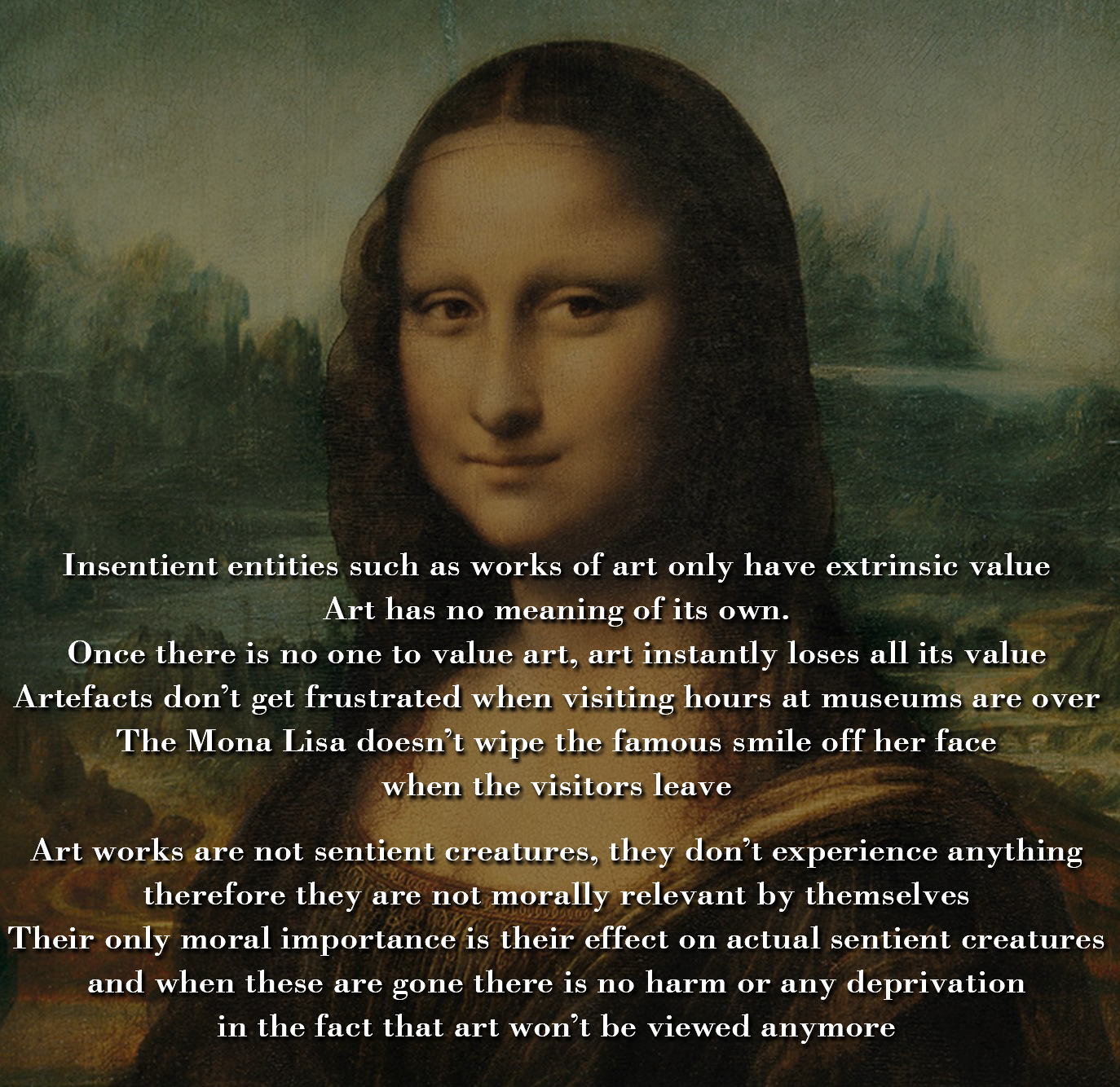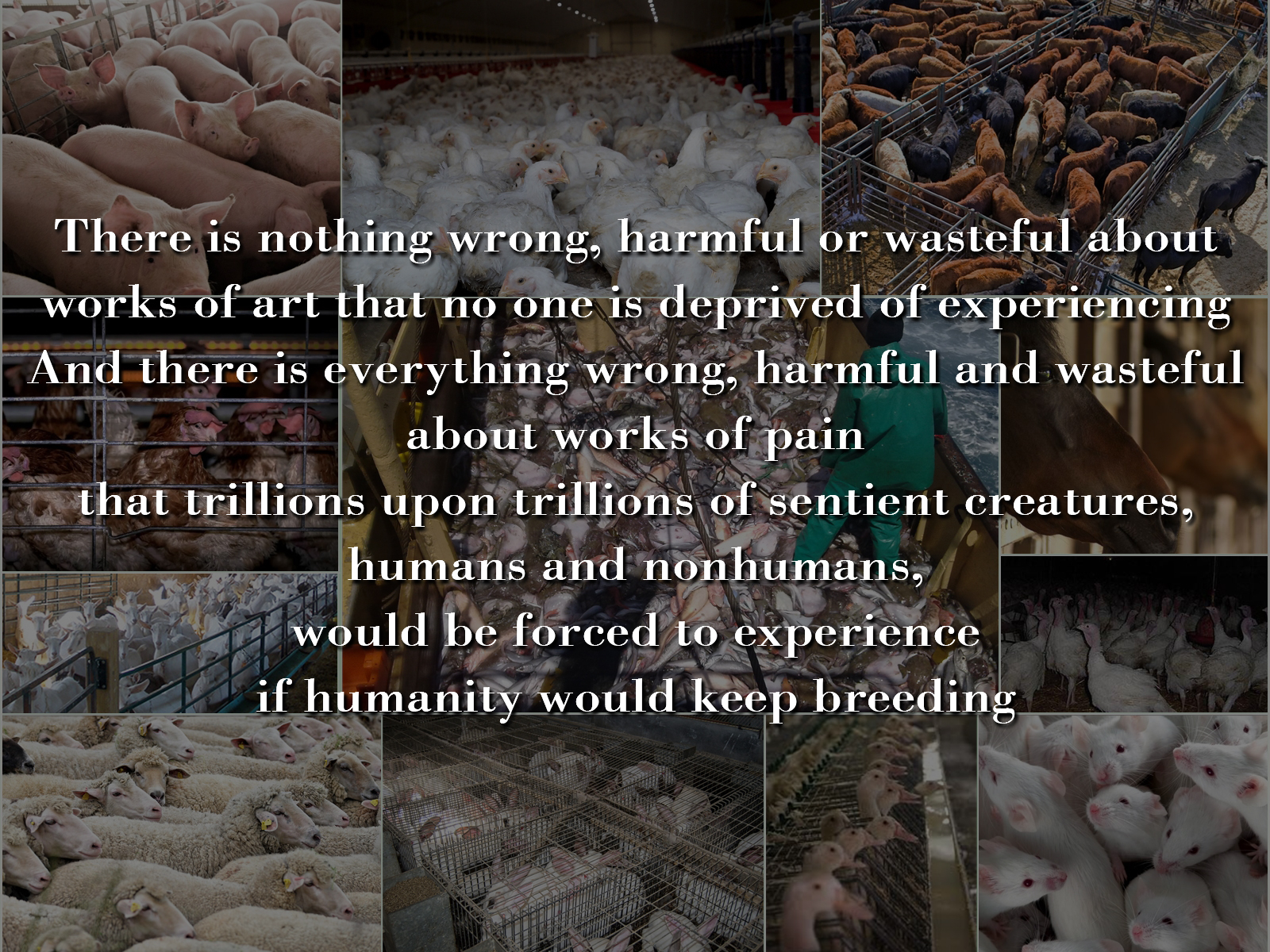
Somewhat proximate to the rosy prophet pro-natalist type, mentioned in the former text, is the ‘enthusiastic art dealer’. These are pro-natalists who despite spending much more time using human technological innovations by playing Candy Crush on their smartphones than reading Chekov or visiting museums, they are concerned” about human works of art going to waste if humanity goes extinct.
Of course, for most of these claimers the only part art plays in their life is when they are artistically using it to make a pro-natalist claim. And even then it is not exactly Shakespeare. But I’ll ignore the blatant pretence and try to take this claim seriously.
No Actual Waste of Anything
Art has no meaning of its own. Insentient entities only have extrinsic value, and that includes each and every work of art that was ever created regardless of the great value it has for sentient entities which only they have intrinsic value. Once there is no one to value art, art instantly loses all its value. Works of art don’t get frustrated when visiting hours at museums are over, the Mona Lisa doesn’t wipe the famous smile off her face when the visitors leave, and classical books don’t have existential crisis when no one seems to be reading them anymore. Art works are not sentient creatures, they don’t experience anything, therefore they are not morally relevant by themselves. Their only moral importance is their effect on actual sentient creatures and when these are gone there is no harm or any deprivation in the fact that art won’t be viewed anymore. Without anyone reflecting on a masterpiece such as Catch-22 or Water Lilies it is just ink on paper, and The Seventh Seal is just a thin flexible stripe coated with light sensitive emulation.
It is simply irrelevant to consider wasteful a state where insentient entities are no longer experienced by anyone, when there is no longer anyone to value them. Not experiencing art is wasteful only if there is someone who can value it and is deprived of experiencing it. But no one is anxiously waiting to listen to Mozart’s Symphony No. 41 or watch Café Terrace at Night before being created, and no one is harmed by not being able to do it if no one is ever created. There are no harms or deprivations in non-existence, there is literally nothing and no one. No one is missing anything or is harmed by anything. Just like no one had been deprived of a great life that no one had experienced, no one would be deprived of a great art work that no one had experienced.
I have argued in a text called Sacrifice that no one’s suffering should be justified by the pleasures of others, no matter how many others there are and how great the pleasures are, when the alternative is that no one would exist and so no one would seek pleasures and no one would ever suffer. But the argument in the center of this text is way worse since it is not even implying that at least some sentient creatures (practically numerous) must be sacrificed for the sake of the pleasures of others – obviously an utterly appalling argument in itself – but that some sentient creatures (again practically numerous) must be sacrificed for the sake of art works. Not for the sake of enjoying art works, but for the sake of art works themselves. That is the case because this argument is raised against human extinction despite that when humans are gone all the art works would lose all their meaning. It is implausible to raise the “artistic” argument against human extinction because obviously in the case of extinction humans couldn’t enjoy fine art, and fine art has meaning only if humans exist. And the same goes for any other human activity.
We can replace art with every human action and the (il)logic of this claim is supposed to work just as much. For example, if humanity goes extinct there would be no gum chewing anymore. We would obviously say that gum chewing has no meaning of its own and so there is no harm in that activity not taking place anymore, once humans are gone no one would be deprived of not chewing gum. The “artistic” pro-natalists would probably reply that gum chewing can’t be compared with art since the latter is way more meaningful and important than something trivial and insignificant as gum chewing. And that exactly proves that they are attributing intrinsic value to art works. The fact that this claim is raised specifically against human extinction goes to show that it at least implies that art is in itself more important than sentient creatures, a factor that makes this claim not only cruel and unethical but also fascist in a sense of placing objects before subjects.
An Actual Need to Waste Everything
The fact that there is nothing wrong, harmful or wasteful about works of art that no one would experience if no one exists and therefore no one is deprived of them (or anything else), is mostly a counter argument to the claim that human extinction is wrong due to all the alleged art waste, but it is not in itself an argument for human extinction. Clearly the motivation behind the argument against procreation is not that every positive thing humans ever did wouldn’t really be gone to waste had humanity gone extinct, but that everything negative that humans are doing and would ever do would be prevented.
Had humanity gone extinct before the 20th century for example, art works such as The Catcher in the Rye, The Lord of the Files, 1984, To Kill a Mocking Bird, Chaplin’s Modern Times, Matisse’s The Dance, Dali’s The Persistence of Memory and etc., wouldn’t have been created, and all the pre 20th century art works wouldn’t be experienced anymore. However, besides that it wouldn’t matter to anyone because there would be no one to be deprived of any of that, there are many other things that wouldn’t have been experienced had humanity gone extinct before the 20th century. Just a partial list: two world wars, hundreds of other wars, all the war crimes, all the reeducation camps, the famine in China, the famine in Ukraine, the famine in Japan, the famine in Russia, the famine in India, the famine in Somalia, the famine in Ethiopia, the famine in Mozambique, the famine in Yemen, the famine in Sudan, all the rapes, all the murders, all the tortures, all the concentration camps in Poland, Germany, Cambodia and North Korea, all the diseases, the Holocaust, the ethnic cleansing in Rwanda, the ethnic cleansing in Armenia, the ethnic cleansing in Yugoslavia, the ethnic cleansing in Cambodia, all the animals experimentations, all the fishing, all the hunting, all the beating, all the humiliations, all the accidents, all the disappointments, all the frustrations, all the pains, and every second in every factory farm – humanity’s worst work ever, all would have been prevented.
The question shouldn’t be is the beauty that humans create worth the ugliness that they create, and that is not because there is no way that it is, but because this is a false equivalence.
It is true that as long as humanity exists, there would be great works of art and great works of pain. But as opposed to great works of art that there is no harm or deprivation in the absence of anyone enjoying them, if humanity’s great works of pain won’t be stopped there is certainly an immense harm to an immense number of sentient creatures. Therefore it is not even a case of incomparable balance between harms and pleasures, but a case of incomparable harm and no harm at all.
There is nothing wrong, harmful or wasteful about works of art that no one is deprived of experiencing. And there is everything wrong, harmful and wasteful about works of pain that trillions upon trillions of sentient creatures, humans and nonhumans, would be forced to experience if humanity won’t go extinct. Therefore, stopping humanity’s works of pain would be the greatest work of art ever created.


Leave a Reply